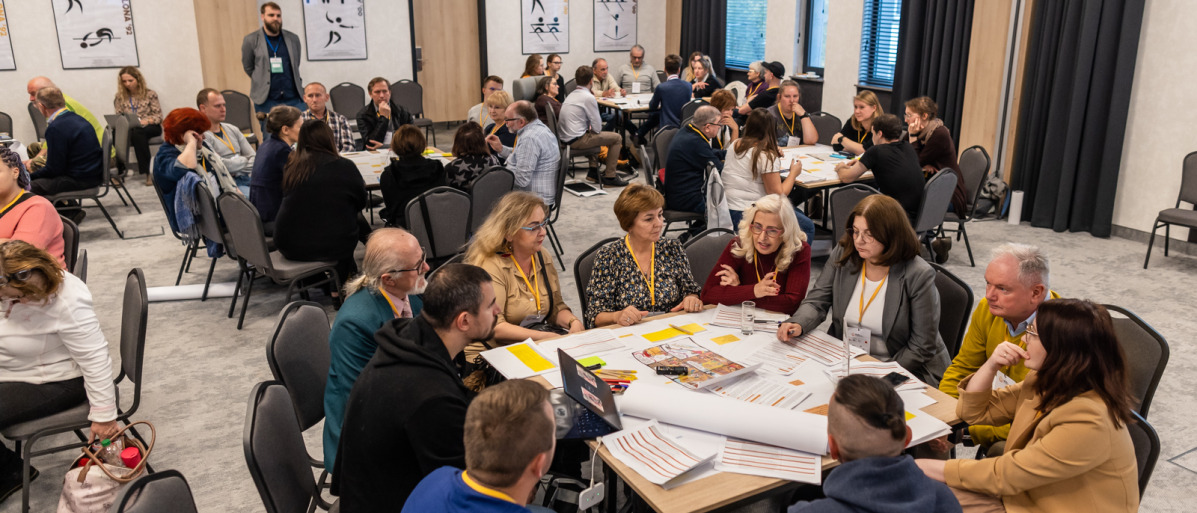
In a brand new publication we look at how residents contribute to up to date coverage recommendation via residents’ assemblies – a type of public participation that has change into more and more well-liked in Germany and Poland in recent times.
Residents are not often concerned in conventional types of coverage recommendation. However that is starting to vary and one may virtually converse of a “participatory flip”, underpinned by the emergence of types of coverage and social session that afford residents a extra lively position. Whether or not political decision-makers harness the total potential of residents’ experience relies upon to a big diploma on how assemblies are initiated and carried out.
Placing residents’ experience to work
In a contribution to a new anthology, my colleague Daniel Oppold and I analyze residents’ assemblies from this angle and think about whether or not they are often thought-about an impartial type of public session to advise policymakers. A better have a look at some residents’ assemblies beforehand held in Germany and Poland reveals that this format is well-suited to reinforce and broaden the up to date coverage recommendation panorama. Particularly, residents’ assemblies can create areas through which the views of residents chosen by lottery take centre-stage alongside the collaborative improvement of coverage suggestions. These areas of discourse and their outputs allow policymakers – and society at giant – to faucet into residents’ experiential data and thus differ significantly from different types of public session.
Nevertheless, the success of efforts to faucet into this potential depends upon quite a few components that affect each the standard of the method and the ensuing suggestions. Whereas the interactions and enter offered by residents are essential, it is necessary to not overlook the broader circumstances surrounding the method and its preparation. The authorized standing of the method and its integration throughout the democratic institutional ecosystem are significantly vital, for instance.
Involving residents’ assemblies in decision-making processes
Our analysis coated a variety of Polish, German and worldwide case research. We had been to notice that in a number of circumstances, residents’ assemblies had been granted mandates that went past a purely advisory capability. In Poland, for instance, some leaders in native authorities pledged to implement suggestions that acquired the backing of over 80 % of a residents’ meeting. Placing this into observe has proved tough at occasions, however this dedication on the a part of democratically elected officers and our bodies provides substantial weight to public participation processes and shifts some decision-making energy to the general public – as represented by the residents’ meeting – albeit not directly. With this improvement, residents’ assemblies are pushing on the limits of coverage recommendation and social consultancy. By granting them a stake in decision-making, these political actors have acknowledged residents’ assemblies – not like knowledgeable commissions or stakeholder participation processes – as a type of deliberative democracy with the capability to ship outcomes with a legitimacy just like that of consultant democracy.
Nevertheless, even when most residents’ councils function in a purely advisory capability, they will nonetheless present priceless enter to information decision-making processes and enrich the general public debate on tackling varied challenges going through society by producing further choices. With a view to keep away from frustration or disappointment amongst these concerned, it is necessary that organisers make clear upfront, how the suggestions of an meeting can be taken up by political actors and native authorities, and set up a transparent position for the meeting throughout the political panorama and public discourse. In observe, that is finest achieved when assemblies are referred to as – ideally by mutual settlement – via related consultant democratic our bodies (district and metropolis councils on the municipal stage, for instance) and their goals are clearly communicated to the general public. As well as, the query(s) put to the residents’ meeting also needs to be developed in a participatory planning course of that takes totally different views, concepts and experiences under consideration.
Backside-up initiatives present potential
Residents’ assemblies are regularly initiated by civil society organisations. Each Germany and Poland have seen nationwide residents’ assemblies that had been initiated “from the underside up”. The initiators hoped to harness the potential of residents’ assemblies by focusing on political home windows of alternative and organizing giant campaigns that flanked the participation course of. In Germany, for instance, the “Mehr Demokratie” affiliation and others initiated the “Residents’ Meeting for Democracy” and pioneered this type of public participation and session on the federal stage, producing widespread curiosity within the format and stimulating a broad debate on the probabilities of increasing the prevailing institutional panorama. The “Residents’ Meeting on Germany’s Function within the World” subsequently convened by the Bundestag and the announcement by the governing coalition that it will think about making assemblies a everlasting fixture will be attributed to the success of the “Residents’ Meeting on Democracy”.
The underside-up nationwide residents’ meeting on vitality prices in Poland adopted an identical arc by taking on a urgent concern to display that consultations involving a bunch of randomly chosen residents, supplemented by enter from consultants, may generate useful concepts and determine potential options. Following within the footsteps of earlier successes on the municipal stage, the nationwide residents’ meeting anchored the idea in public consciousness and led to additional assemblies on the nationwide stage.
You’ll find out extra in our publication about how residents’ assemblies can seize and amplify the voices of civil society to help socio-political discourse and decision-making:
- Oppold, D., & Stasiak, D. (2024). Bürger(räte) in der Politikberatung in Deutschland und Polen. In A. Kopka, & D. Piontek (Eds.), Politische Expertenkultur in Deutschland und Polen (pp. 367-388). Wiesbaden: Springer Fachmedien Wiesbaden. https://doi.org/10.1007/978-3-658-43365-9_15
- Stasiak, D., & Oppold, D. (2022). Głos doradczy społeczeństwa: panele obywatelskie w Niemczech i Polsce. In A. Kopka, & D. Piontek (Eds.), Polityczna kultura ekspercka w Polsce i w Niemczech. Politycy, doradcy i lobbyści w perspektywie porównawczej (pp. 333-353). Poznań: Wydawnictwo Naukowe Wydziału Nauk Politycznych i Dziennikarstwa Uniwersytetu im. Adama Mickiewicza.
Trending Merchandise







